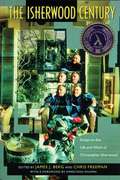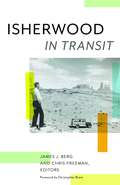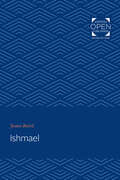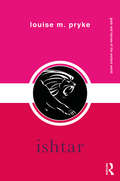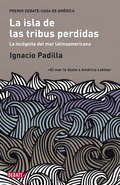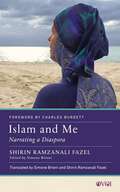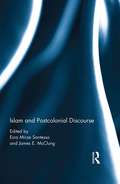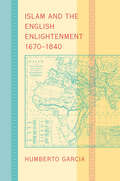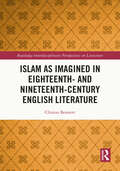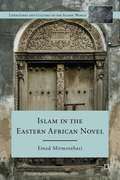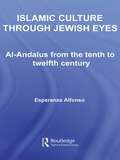- Table View
- List View
The Isherwood Century: Essays on the Life and Work Of Christopher Isherwood
by Chris Freeman James J. BergCalled “the best English prose writer of this century” by Gore Vidal, Christopher Isherwood is best known for Goodbye to Berlin—the inspiration for the musical Cabaret—but is also the author of plays, novels, and diaries. The Isherwood Century gathers twenty-four essays and interviews offering a fresh, in-depth view of Isherwood, his literary legacy, and his continuing influence as both a literary and a gay pioneer.
Isherwood in Transit
by James J. Berg Chris FreemanNew perspectives on Christopher Isherwood as a searching and transnational writer &“Perhaps I had traveled too much, left my heart in too many places,&” muses the narrator of Christopher Isherwood&’s novel Prater Violet (1945), which he wrote in his adopted home of Los Angeles after years of dislocation and desperation. In Isherwood in Transit, James J.Berg and Chris Freeman bring together diverse Isherwood scholars to understand the challenges this writer faced as a consequence of his travel. Based on a conference at the Huntington Library, where Isherwood&’s recently opened papers are held, Isherwood in Transit considers the writer not as an English, continental, or American writer but as a transnational one, whose identity, politics, and beliefs were constantly transformed by global connections and engagements arising from journeys to Germany, Japan, China, and Argentina; his migration to the United States; and his conversion to Vedanta Hinduism in the 1940s.Approaching Isherwood&’s rootlessness and restlessness from various perspectives, these essays show that long after he made a new home in California and became an American citizen, Christopher Isherwood remained unsettled, although his wanderings became spiritual and personal rather than geographic.Contributors: Barrie Jean Borich, DePaul U; Jamie Carr, Niagara U; Robert L. Caserio, Penn State U, University Park; Lisa Colletta, American U of Rome; Lois Cucullu, U of Minnesota; Jaime Harker, U of Mississippi; Carola M. Kaplan, California State U, Pomona; Calvin W. Keogh, Central European U, Budapest; Victor Marsh; Wendy Moffat, Dickinson College; Xenobe Purvis; Bidhan Roy, California State U, Los Angeles; Katharine Stevenson, U of Texas at Austin; Edmund White.
Ishmael
by James BairdOriginally published in 1956. In Ishmael, Professor James Baird responds to the increasing secularization of Western civilization and the creation of what he calls "authentic primitivism." For Baird, the aesthetic austerity of Protestantism undermined the structure of symbols created by Catholicism. In the absence of a meaningful structure of cultural authority in Western civilization, "primary art" took on a quasi-religious role by connecting humans to a transcendent being. Ishmael describes a new system of art, beginning around 1850, that supplanted Christian symbolism. Baird examines writers who helped to create a modern authentic primitivism, with emphasis on Herman Melville, whom Baird sees as a locus of change for the cultural significance of primary art. Baird provides a social history and biography of writers who participated in the primary art movement from 1850 to 1950
Ishtar (Gods and Heroes of the Ancient World)
by Louise M. PrykeIshtar is the first book dedicated to providing an accessible analysis of the mythology and image of this complex goddess. The polarity of her nature is reflected in her role as goddess of sexual love and war, and has made her difficult to characterise in modern scholarship. By exploring this complexity, Ishtar offers insight into Mesopotamian culture and thought, and elucidates a goddess who transcended the limits of gender, divinity and nature. It gives an accessible introduction to the Near Eastern pantheon, while also opening a pathway for comparison with the later Near Eastern and Mediterranean deities who followed her.
IsiZulu Soqobo Incwadi Yokufunda Ibanga 8 Contracted: UBC Contracted
by Nonkululeko Keswa Themba QwabeIzincwadi zeSIZULU SOQOBO yizincwadi eziluchungechunge ezihlelelwe IsiZulu Ulimi lwaseKhaya. Zisukela ebangeni lokuqala kuya kwele-12. Lezi zincwadi zihlelwe zabhalwa kabusha ngohlelo lokufunda lwe-CAPS Isitatimende SeNqubomgomo yoHlelo LweziFundo nokuHlola (NquTaHleHlo). Emazingeni aphakeme eBangeni lesi-7 kuya kwelesi-9 kukhona lezi zincwadi: • Incwadi Yomfundi • Incwadi Kathisha • Incwadi Yokufunda
IsiZulu Soqobo Incwadi Yokufunda Ibanga 8 Uncontracted: UBC Uncontracted
by Nonkululeko Keswa Themba QwabeIzincwadi zeSIZULU SOQOBO yizincwadi eziluchungechunge ezihlelelwe IsiZulu Ulimi lwaseKhaya. Zisukela ebangeni lokuqala kuya kwele-12. Lezi zincwadi zihlelwe zabhalwa kabusha ngohlelo lokufunda lwe-CAPS Isitatimende SeNqubomgomo yoHlelo LweziFundo nokuHlola (NquTaHleHlo). Emazingeni aphakeme eBangeni lesi-7 kuya kwelesi-9 kukhona lezi zincwadi: • Incwadi Yomfundi • Incwadi Kathisha • Incwadi Yokufunda
IsiZulu Soqobo Incwadi Yokufunda Ibanga 9: UBC Contracted
by Nonkululeko Keswa Themba Qwabe Njabulo MadlalaIzincwadi zeSIZULU SOQOBO yizincwadi eziluchungechunge ezihlelelwe IsiZulu Ulimi lwaseKhaya (Home Language). Zisukela ebangeni lokuqala kuya kwele-12 (Grade 1-12). Lezi zincwadi zihlelwe zabhalwa kabusha ngohlelo lokufunda lwe-CAPS (Curriculum and Assessment Policy Statement) Isitatimende SeNqubomgomo yoHlelo LweziFundo nokuHlola (NquTaHleHlo). Emazingeni aphakeme (SeniorPhase) eBangeni lesi-7 kuya kwelesi-9 (Grade 7-9) kukhona lezi zincwadi: • Incwadi Yomfundi (Learner Book) • Incwadi Kathisha (Teacher Guide) • Incwadi Yokufunda (Reader)
IsiZulu Soqobo Incwadi Yokufunda Ibanga 9 Uncontracted: UBC Uncontracted
by Nonkululeko Keswa Themba Qwabe Njabulo MadlalaIzincwadi zeSIZULU SOQOBO yizincwadi eziluchungechunge ezihlelelwe IsiZulu Ulimi lwaseKhaya (Home Language). Zisukela ebangeni lokuqala kuya kwele-12 (Grade 1-12). Lezi zincwadi zihlelwe zabhalwa kabusha ngohlelo lokufunda lwe-CAPS (Curriculum and Assessment Policy Statement) Isitatimende SeNqubomgomo yoHlelo LweziFundo nokuHlola (NquTaHleHlo). Emazingeni aphakeme (SeniorPhase) eBangeni lesi-7 kuya kwelesi-9 (Grade 7-9) kukhona lezi zincwadi: • Incwadi Yomfundi (Learner Book) • Incwadi Kathisha (Teacher Guide) • Incwadi Yokufunda (Reader)
IsiZulu Soqobo Incwadi yomfundi: UBC Contracted
by A. B. Mahlangu N. F. Mbhele S. E. Zulu T. M. MbheleIzincwadi zeSIZULU SOQOBO yizincwadi eziluchungechunge ezihlelelwe IsiZulu Ulimi lwaseKhaya. Zisukela ebangeni lokuqala kuya kwele-12. Lezi zincwadi zihlelwe zabhalwa kabusha ngohlelo lokufunda lwe-CAPS Isitatimende SeNqubomgomo yoHlelo LweziFundo nokuHlola (NquTaHleHlo). Emazingeni aphakeme eBangeni lesi-7 kuya kwelesi-9 kukhona lezi zincwadi: • Incwadi Yomfundi • Incwadi Kathisha • Incwadi Yokufunda
IsiZulu Soqobo Incwadi Yomfundi Ibanga 10 Contracted: UBC Contracted
by A B Mahlangu N F Mbhele S E ZuluLezi yizincwadi ezihlelelwe ukufundisa ulimi lwesiZulu emaBangeni 10-12 (Grade 10-12). Lezi zincwadi zibhalwe ngendlela yokulandela uhlelo lwemfundo yeNqubomgomo yesiTatimende soHlelo nokuHlola (NquTaHleHlo) (iCurriculum and Assessment Policy Statement – CAPS). Kulolu chungechunge lwezincwadi kukhona Incwadi KaThisha (Teacher Guide) neNcwadi Yomfundi (Learner Book).
IsiZulu Soqobo Incwadi Yomfundi Ibanga 10 Uncontracted: UBC Uncontracted
by A B Mahlangu N F Mbhele S E ZuluLezi yizincwadi ezihlelelwe ukufundisa ulimi lwesiZulu emaBangeni 10-12 (Grade 10-12). Lezi zincwadi zibhalwe ngendlela yokulandela uhlelo lwemfundo yeNqubomgomo yesiTatimende soHlelo nokuHlola (NquTaHleHlo) (iCurriculum and Assessment Policy Statement – CAPS). Kulolu chungechunge lwezincwadi kukhona Incwadi KaThisha (Teacher Guide) neNcwadi Yomfundi (Learner Book).
IsiZulu Soqobo Incwadi Yomfundi Ibanga 11 Contracted: UBC Contracted
by A. B. Mahlangu N. F. Mbhele S. E. ZuluLezi yizincwadi ezihlelelwe ukufundisa ulimi lwesiZulu emaBangeni 10-12 (Grade 10-12). Lezi zincwadi zibhalwe ngendlela yokulandela uhlelo lwemfundo yeNqubomgomo yesiTatimende soHlelo nokuHlola (NquTaHleHlo) (iCurriculum and Assessment Policy Statement – CAPS). Kulolu chungechunge lwezincwadi kukhona Incwadi KaThisha (Teacher's Guide) neNcwadi Yomfundi (Learner's Book). Indlela yokufundisa etholakala kule ncwadi yakhelwe esisekelweni sokwazi nokuqonda ukuthi kufundiswa kanjani. Ukulalela Imisebenzi yokulalela mihle futhi izithinta zonke izinhlobo ezahlukene zokulalela ezifana nokulalelela ulwazi oluthile, ukulalelela ukuncoma, ukulalelela ukuhlaziya okunzulu nokuhluza. Izakhiwo Nezimiso Zolimi Izakhiwo Nezimiso Zolimi zifundiswa futhi zihlolwe ngokuqukethwe endabeni. Ukubhala Izinhlobonhlobo zemibhalo emide nemifishane zikhona kule ncwadi futhi abafundi banikezwa izibonelo ngaphambi kokuba bazibhale. Ikomidi Labacwaningi lika-2012
IsiZulu Soqobo Incwadi Yomfundi Ibanga 11 Uncontracted: UBC Uncontracted
by A. B. Mahlangu N. F. Mbhele S. E. ZuluLezi yizincwadi ezihlelelwe ukufundisa ulimi lwesiZulu emaBangeni 10-12 (Grade 10-12). Lezi zincwadi zibhalwe ngendlela yokulandela uhlelo lwemfundo yeNqubomgomo yesiTatimende soHlelo nokuHlola (NquTaHleHlo) (iCurriculum and Assessment Policy Statement – CAPS). Kulolu chungechunge lwezincwadi kukhona Incwadi KaThisha (Teacher's Guide) neNcwadi Yomfundi (Learner's Book). Indlela yokufundisa etholakala kule ncwadi yakhelwe esisekelweni sokwazi nokuqonda ukuthi kufundiswa kanjani. Ukulalela Imisebenzi yokulalela mihle futhi izithinta zonke izinhlobo ezahlukene zokulalela ezifana nokulalelela ulwazi oluthile, ukulalelela ukuncoma, ukulalelela ukuhlaziya okunzulu nokuhluza. Izakhiwo Nezimiso Zolimi Izakhiwo Nezimiso Zolimi zifundiswa futhi zihlolwe ngokuqukethwe endabeni. Ukubhala Izinhlobonhlobo zemibhalo emide nemifishane zikhona kule ncwadi futhi abafundi banikezwa izibonelo ngaphambi kokuba bazibhale. Ikomidi Labacwaningi lika-2012
IsiZulu Soqobo Incwadi Yomfundi Ibanga 7 Uncontracted: UBC Uncontracted
by A. B. Mahlangu N. F. Mbhele S. E. Zulu T. M. MbheleIzincwadi zeSIZULU SOQOBO yizincwadi eziluchungechunge ezihlelelwe IsiZulu Ulimi lwaseKhaya. Zisukela ebangeni lokuqala kuya kwele-12. Lezi zincwadi zihlelwe zabhalwa kabusha ngohlelo lokufunda lwe-CAPS Isitatimende SeNqubomgomo yoHlelo LweziFundo nokuHlola (NquTaHleHlo). Emazingeni aphakeme eBangeni lesi-7 kuya kwelesi-9 kukhona lezi zincwadi: • Incwadi Yomfundi • Incwadi Kathisha • Incwadi Yokufunda
La isla de las tribus perdidas: La incógnita del mar latinoamericano
by Ignacio PadillaGanador del Tercer Premio Debate-Casa de América, este maravilloso ensayo retrata América Latina a través de su relación con el mar. «Un ensayo deslumbrante que recorre la tradición literaria de todo un continente.» Así describía el jurado del III Premio Debate-Casa de América La isla de las tribus perdidas, una elegante narración que retoma los motivos clásicos del naufragio, la tempestad, el barco o la isla, para contar cómo Latinoamérica se convierte sin quererlo en el reverso de Occidente. Una bella reflexión donde Gabriel García Márquez, Julio Cortázar, Jorge Luis Borges, Carlos Fuentes, Juan Carlos Onetti o Alejo Carpentier son las aguas en que se refleja la relación conflictiva de un continente con el mar. Al fin y al cabo, desde el navegante ibérico hasta el esclavo africano, entre el comerciante chino y el fugitivo de guerras o hambrunas europeas, América Latina recibió del mar su sangre, y con ella le surgiótambién una secular hostilidad oceánica. Y tanto le duele el mar a América Latina que decidió vivir de espaldas a él.
La isla de las tribus perdidas
by Ignacio Padilla«Un mundo abrumado por su propia naturaleza, visto a través de las metáforas del agua, surge ante nosotros en este ensayo deslumbrante que recorre la tradición literaria de todo un continente», así justificaba su fallo el jurado del III Premio Iberoamericano de Ensayo Debate-Casa de América. En efecto, La isla de las tribus perdidas es una elegante narración que sigue la estela de Ulises y retoma los motivos clásicos del naufragio, la tempestad, el barco o la isla, para contar cómo Latinoamérica se convierte sin quererlo en el reverso de Occidente. Una bella inmersión en las fuentes literarias americanas donde Gabriel García Márquez, Julio Cortázar, Jorge Luis Borges, Carlos Fuentes, Juan Carlos Onetti o Alejo Carpentier son las aguas en que se refleja la relación conflictiva de un continente con el mar, pues tanto le duele el mar a América Latina que decidió vivir de espaldas a él.
Islam and Me: Narrating a Diaspora (Other Voices of Italy)
by Shirin Ramzanali FazelGrowing up in Mogadishu, Somalia, Shirin Ramzanali Fazel was immersed in the language and culture of Italy, Somalia’s former colonizer. Yet when she moved to Italy as a young mother in the 1970s, she discovered a country where immigrants and Muslims were viewed with a mixture of curiosity and suspicion–where, even today, she and her children must seemingly prove they are Italian. In Islam and Me, Fazel tells her story and shares the experiences of other Muslim women living in Italy, revealing the wide variety of Muslim identities and the common prejudices they encounter. Looking at Italian school textbooks, newspapers, and TV programs, she invites us to change the way Muslim immigrants, and especially women, are depicted in both news reports and scholarly research. Islam and Me is a meditation on our multireligious, multiethnic, and multilingual reality, as well as an exploration of how we might reimagine national culture and identity so that they become more diverse, inclusive, and anti-racist.
Islam and Postcolonial Discourse: Purity and Hybridity
by Esra Mirze Santesso James McClungLargely, though not exclusively, as a legacy of the 2001 attack on the World Trade Center, Islamic faith has become synonymous in many corners of the media and academia with violence, which many believe to be its primary mode of expression. The absence of a sophisticated recognition of the wide range of Islamic subjectivities within contemporary culture has created a void in which misinterpretations and hostilities thrive. Responding to the growing importance of religion, specifically Islam, as a cultural signifier in the formation of a postcolonial self, this multidisciplinary collection is organized around contested terms such as secularism, Islamopolitics, female identity, and Islamophobia. The overarching goal of the contributors is to facilitate a deeper understanding of the full range of experiences within Islam as well as the figure of the Muslim, thus enabling a new set of questions about religion’s role in shaping postcolonial identity.
Islam and the English Enlightenment, 1670–1840
by Humberto GarciaA corrective addendum to Edward Said’s Orientalism, this book examines how sympathetic representations of Islam contributed significantly to Protestant Britain’s national and imperial identity in the eighteenth century.Taking a historical view, Humberto Garcia combines a rereading of eighteenth-century and Romantic-era British literature with original research on Anglo-Islamic relations. He finds that far from being considered foreign by the era’s thinkers, Islamic republicanism played a defining role in Radical Enlightenment debates, most significantly during the Glorious Revolution, French Revolution, and other moments of acute constitutional crisis, as well as in national and political debates about England and its overseas empire. Garcia shows that writers such as Edmund Burke, Lady Mary Wortley Montagu, Samuel Taylor Coleridge, Robert Southey, and Percy and Mary Shelley not only were influenced by international events in the Muslim world but also saw in that world and its history a viable path to interrogate, contest, and redefine British concepts of liberty.This deft exploration of the forgotten moment in early modern history when intercultural exchange between the Muslim world and Christian West was common resituates English literary and intellectual history in the wider context of the global eighteenth century. The direct challenge it poses to the idea of an exclusionary Judeo-Christian Enlightenment serves as an important revision to post-9/11 narratives about a historical clash between Western democratic values and Islam.
Islam as Imagined in Eighteenth and Nineteenth Century English Literature (Routledge Interdisciplinary Perspectives on Literature)
by Clinton BennettSince medieval times, English literature has often demonized Muslims. The term ‘Islamophobia’ is recent, but the phenomenon is old. This survey of literature focusing on the modern period up to 1914 identifies negative ideas about Islam in novels and plays. Some works are iconic, some more obscure. However, the book highlights writers who challenged stereotypes and tended to see Muslims as equally capable of virtue and vice as Christians and others. The book deals with the role of the imagination in depicting others and how this serves authors’ agendas. The conclusion brings the book’s thesis into dialogue with the debate in the USA today between supporters of multiculturalism and its critics. Anyone interested in how stereotypes are formed, perpetuated and can be challenged will profit from this book. It is aimed at a non-specialist readership.
Islam as Imagined in Eighteenth and Nineteenth Century English Literature (Routledge Interdisciplinary Perspectives on Literature)
by Clinton BennettSince medieval times, English literature has often demonized Muslims. The term ‘Islamophobia’ is recent, but the phenomenon is old. This survey of literature focusing on the modern period up to 1914 identifies negative ideas about Islam in novels and plays. Some works are iconic, some more obscure. However, the book highlights writers who challenged stereotypes and tended to see Muslims as equally capable of virtue and vice as Christians and others. The book deals with the role of the imagination in depicting others and how this serves authors’ agendas. The conclusion brings the book’s thesis into dialogue with the debate in the USA today between supporters of multiculturalism and its critics. Anyone interested in how stereotypes are formed, perpetuated and can be challenged will profit from this book. It is aimed at a non-specialist readership.
Islam in the Eastern African Novel
by Emad MirmotahariThis study of the sub-Saharan African novel interprets representations of Islam as a central organising presence that generates new conceptual questions and demands new critical frameworks with which to approach categories like nationhood, race, diaspora, immigration, and Africa's multiple colonial pasts.
Islam, Migrancy, and Hospitality in Europe (Literatures and Cultures of the Islamic World)
by Meyda YeğenoğluThis book cuts across important debates in cultural studies, literary criticism, politics, sociology, and anthropology. Meyda Yegenoglu brings together different theoretical strands in the debates regarding immigration, from Jacques Lacan's psychoanalytic understanding of the subject formation, to Zygmunt Bauman's notion of the stranger.
Islamic Culture Through Jewish Eyes: Al-Andalus from the Tenth to Twelfth Century (Routledge Studies in Middle Eastern Literatures)
by Esperanza AlfonsoIslamic Culture Through Jewish Eyes analyzes the attitude towards Muslims, Islam, and Islamic culture as presented in sources written by Jewish authors in the Iberian Peninsula between the tenth and the twelfth centuries. By bringing the Jewish attitude towards the "other" into sharper focus, this book sets out to explore a largely overlooked and neglected question – the shifting ways in which Jewish authors constructed communal identity of Muslims and Islamic culture, and how these views changed overtime. The book’s methodological sophistication and wide range of sources make it a valuable resource for scholars and researchers of comparative literature and cultural studies.

